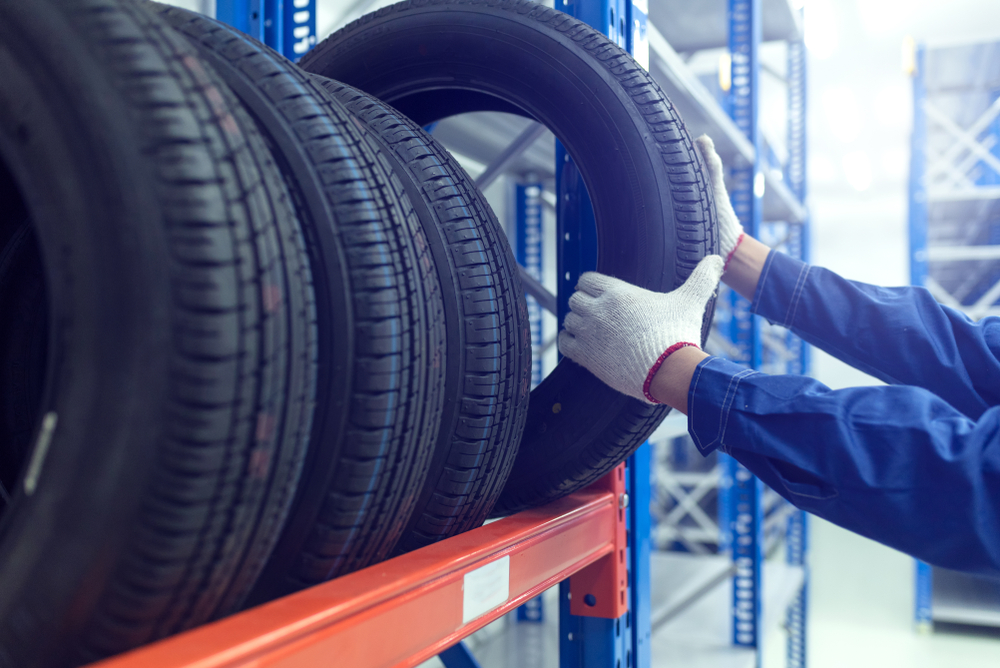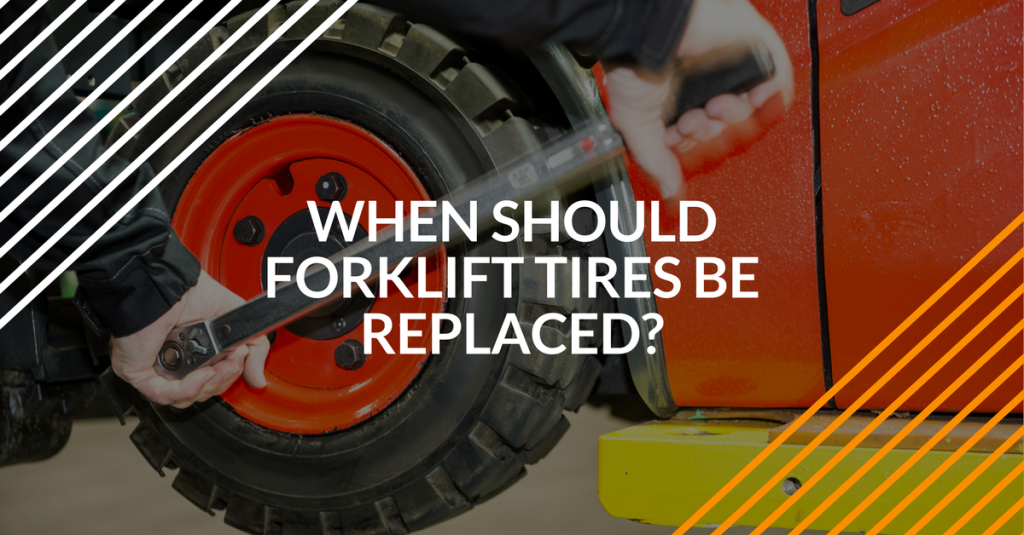KNOW WHEN IT’S TIME FOR A FORKLIFT TIRE CHANGE
The tires are among the most crucial forklift safety components. So, you need to know when it is time for a forklift tire change to help reduce truck downtime, maintain consistent productivity levels, and limit the risk of worker accidents and injuries.
With training & certification from FLC, we’ll show your company the importance of things like:
✓ Forklift tire repair
✓ Forklift tire changes
✓ Forklift tire replacements
✓ And much more
Timing is everything. Replacing your forklift tires too soon can cost your business money. On the other hand, waiting too long to replace your forklift tires can make it risky for workers to safely operate their equipment. But, if you know how long forklift tires typically last, you can make the right decision to accommodate from both business and safety points of view.
DO YOU NEED A FORKLIFT TIRE CHANGE?
To maximize your forklift tires’ lifespan, you must first use the right tires for the job and take into consideration how, where, and under what conditions your equipment will be utilized. Proper maintenance performed on a regular basis will also help extend the life of a forklift’s tires. Over time, proper forklift tire maintenance can save your business thousands of dollars as well.
When to Change a Forklift Tire
Here are some factors that will help you determine when it’s time for a forklift tire change:
1. Tire Usage
The durability of forklift tires is measured in hours a lift is operated rather than the number of miles driven. For example, tires will last much longer on a truck used only 10 hours a week when compared to one used 40 hours a week.
2. Operator Driving Habits
An operator’s habits directly affect the wear and tear on forklift tires. If operators engage in quick starts and stops and sharp cornering, the life of the tires will be shortened. Driving too fast and spinning the tires will also cause them to wear out sooner than expected.
3. Floor Conditions
Driving on smooth surfaces can help extend the lifespan of forklift tires. Conversely, frequent driving on rough or abrasive surfaces will require you to replace your forklift tires more often. Debris on the floor can also make it unsafe to drive and necessitate forklift tire repair.
4. Jobsite Conditions
A humid indoor worksite can result in condensation accumulating on the floor, which can cause forklift tires to spin frequently and put additional wear on them. Driving a forklift without a load can also shorten forklift tire life, due to increased pressure from the counterweight.
5. Tire Type
Pneumatic tires tend to wear out faster than solid tires. They can also be punctured, which can cause the tires to deflate. Polyurethane tires, a type of press-on solid tire, generally last twice as long as cushion tires.
Reasons to Pursue Forklift Tire Repair
Common reasons for forklift tire repair include

✓ Contact with Chemicals
Gasoline, oil, and grease are common in warehouses and other indoor jobsites. Frequent contact with these and other harsh chemicals can create wear patterns that lead to blowouts and forklift tire changes.
✓ Heat
Heat buildup on forklift tires can be a problem, especially when forklifts are operated during long shifts. Heat causes forklift tire rubber to soften and changes the amount of support provided. Heat can also cause the rubber on forklift tires to separate and fall off the tires.
✓ Uneven Driving Surfaces
Driving over bumps or on uneven surfaces can cause tire damage. Loose rocks and gravel can puncture some types of forklift tires, and as such, may require you to pursue a forklift tire repair or change.
✓ Inflation Level
Tires that aren’t filled to the proper pressure will wear out more quickly than tires filled to the correct PSI. Over inflation can also result in excessive tire wear.
When to Repair a Forklift Tire
There is no telling when you will need to repair a forklift tire. Fortunately, there are various signs that indicate a forklift tire needs to be replaced, including:
– Tread Wear or Balding
Both pneumatic and solid tires will become less effective as their tread wears down. For pneumatic tires, if the tread is nearly gone or you notice bald spots, it’s time to replace the tires. For solid cushion tires, when the size of the tire is more than 2 in. less than their original size, it’s time for new tires.
– Cuts or Tears
Even if only one of a forklift’s four tires has a cut or tear, replace all four to keep your forklift safe and functioning properly.
– Chunking
Chunking occurs when a solid cushion tire comes into contact with a sharp object such as a dock plate or piece of scrap metal. Tires with chunks missing are unsafe and should be replaced immediately.
– Flat Spots
Driving with wheels that are out of alignment or stopping suddenly while carrying heavy loads can cause flat spots. If you notice flat spots on either pneumatic or cushion tires, it’s time to have your forklift tired replaced.
When to Repair a Forklift Tire: Tips You Need to Know
For safety reasons, never change one forklift tire at a time. Always replace both tires on the same axle, even if one appears to still have plenty of tread.
If your company has a tire press, changing a forklift tire is relatively simple. Use a jack to lift the truck, but never raise it using another forklift. Unscrew the lug nuts and remove the wheel from the axle. Next, remove the worn or damaged tire from the wheel. Attach the wheel to the tire press and press on the new tire. Reattach the wheel to the axle and lower the vehicle to the ground. Test drive the forklift for proper balance.
State and federal laws require workers to be properly trained in forklift wheel and tire maintenance and replacement. If you don’t have a tire press, you may have to outsource the job to a mobile forklift tire-changing service.
Establish a Forklift Tire Changing Policy
Tires play an extremely important role in forklift safety. OSHA requires companies that use forklifts to have a maintenance plan in place for each of their trucks, which should include specific guidelines as to when forklift tires are to be replaced. Your workers also need to be trained as to how and when to inspect tires for damage and wear. A good rule of thumb is to replace forklift tires once a year, regardless of their operating hours.
Once a forklift tire replacement or changing schedule is established, your business can limit the risk of tire issues. Your company can further reduce the risks associated with defective forklift tires if it provides workers with forklift safety training.
The Bottom Line on Forklift Tire Replacement for Your Business
Forklift tires enable operators to perform everyday tasks to the best of their ability. However, tires wear down over time, even on a forklift. If workers understand the importance of forklift tire maintenance, they can identify wear and tear on forklift tires. Plus, these workers can repair or change forklift tires before they impact your business’ daily operations. They can also address defective forklift tires before they contribute to on-the-job accidents or injuries.
Eventually, tires wear down over time, whether it’s a car, forklift, etc.. If workers understand the importance of forklift tire maintenance, they can identify wear and tear on forklift tires. And that’s an important element in understanding how to properly operate a forklift. Plus, these workers can repair or change forklift tires before they impact your business’ daily operations. Reduce your chance of on-the-job accidents or injuries and sign up with FLC today!
Although forklift tire issues are critical to address, they sometimes go undetected at job sites. Thanks to forklift safety training, workers who use forklifts day after day will be well-equipped to spot defective tires before it’s too late.
Enroll in Forklift Safety Training from FLC
Along with OSHA guidelines, we’ll show your employees the importance of tires, advanced safety concepts, and more. If you need training on proper forklift tire replacement and more, FLC offers these courses: Train a Trainer – get your own in house forklift certification expert for only $149! Training Kit – at just $299, this in house forklift training kit has everything you need for a compliant workforce. Bundle Package – combine your in house forklift certification with both courses above for $399.
To receive additional information about our forklift safety training courses or to sign up for one of our courses, please contact us online or call us today at (888) 278-8896.
At FLC, we offer a comprehensive forklift safety training program. We are the most trusted online source for OSHA-compliant forklift certification training, and we can teach your workers how to safely operate a forklift, identify faulty forklift tires, and more. To get started with your OSHA complaint certification today, sign up here! Thanks for choosing FLC for your training & certification needs!

